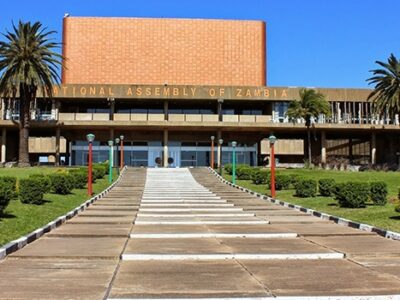The Ministry of Technology and Science has called for a review of Zambia’s Digital Migration Policy, placing a renewed emphasis on enhancing digital audio broadcasting to align with global trends and improve the quality and accessibility of broadcasting services.
Ministry Permanent Secretary, Dr. Brilliant Habeenzu, made the recommendation during a presentation before the Parliamentary Committee on Media, Information, and Communication on Wednesday.
The committee sought to understand the adequacy of the policy and regulatory frameworks under which digital migration was implemented, as well as any legal reforms that were carried out as required by the policy.
The committee also inquired about the status of digital migration, whether the process adhered to the stipulated policy guidelines, and the intended benefits of the migration, including the achievements made so far.
Further, members sought to understand the challenges faced in implementing the Digital Migration Programme and to discuss recommendations for moving forward.
Habeenzu emphasized the importance of engaging with industry stakeholders—such as broadcasters, technology providers, and consumers—during the review process to ensure the policy effectively addresses their needs and concerns.
“Stakeholder engagement is crucial for gathering input and ensuring the Digital Migration Policy is aligned with industry realities and expectations,” Habeenzu said.
He also noted that the ongoing review of the Independent Broadcasting Authority Act should incorporate the updated policy.
The Digital Migration Project was initiated in response to a 2006 resolution by the International Telecommunication Union (ITU), which mandated all countries using terrestrial Bands II, IV, and V to transition from analogue to digital broadcasting by June 17, 2015.
Zambia began the project to replace analogue terrestrial television transmission with digital broadcasting, installing digital transmitters across the country.
However, Habeenzu noted that while the project had reached 90 percent completion, it has since stalled due to government’s decision in 2022 to cancel the project’s loan amidst a national debt crisis.
The decision to terminate the project left the Ministry with an outstanding payment of $12,529,297.74 owed to the contractor, Star Times Technologies Company, for certified works completed before the cancellation.
“The Cabinet resolved to terminate projects financed through loans, including this one, which led to the suspension of the Digital Migration Project,” Habeenzu explained.
Despite the challenges, Habeenzu affirmed that Zambia’s transition from analogue to digital broadcasting is guided by the Digital Migration Policy, which aims to ensure that all broadcasting services delivered through analogue technologies were fully replicated on digital platforms.
The ultimate goal is to phase out analogue broadcasting services at a specified time.
WARNING! All rights reserved. This material, and other digital content on this website, may not be reproduced, published, broadcast, rewritten or redistributed in whole or in part without prior express permission from ZAMBIA MONITOR.












Comments